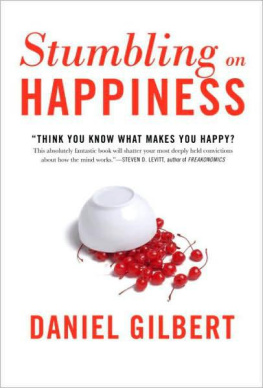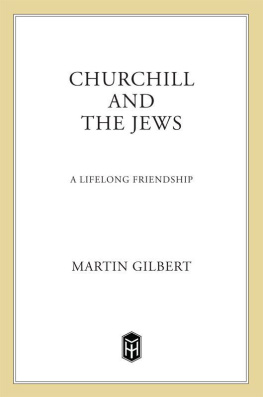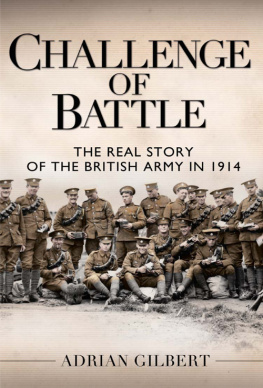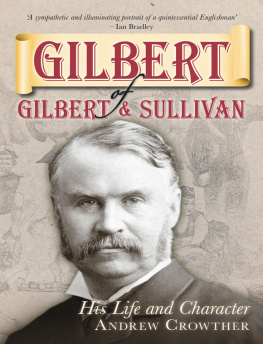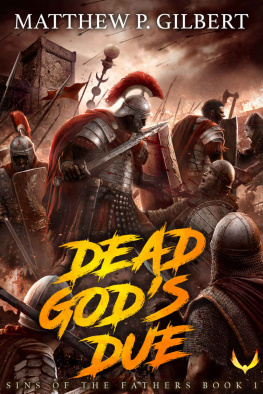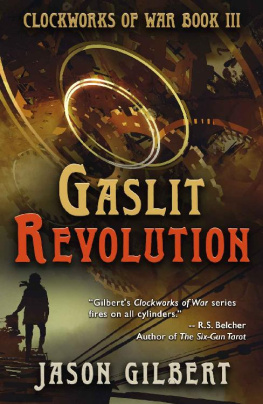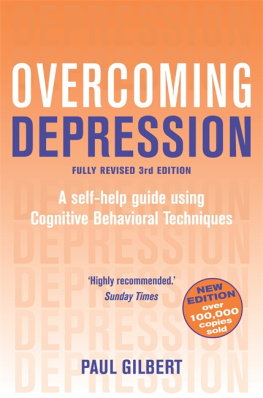Stumbling
on Happiness
DANIEL GILBERT

Alfred A. Knopf New York 2006
CONTENTS
For Oli, under the apple tree
One cannot divine nor forecast the conditions that will make happiness; one only stumbles upon them by chance, in a lucky hour, at the worlds end somewhere, and holds fast to the days, as to fortune or fame.Willa Cather, Le Lavandou, 1902
ACKNOWLEDGMENTS
T HIS IS THE PART OF THE BOOK in which the author typically claims that nobody writes a book by himself and then names all the people who presumably wrote the book for him. It must be nice to have friends like that. Alas, all the people who wrote this book are me, so let me instead thank those who by their gifts enabled me to write a book without them.
First and foremost, I thank the students and colleagues who did so much of the research described in these pages and let me share in the credit. They include Danny Axsom, Mike Berkovits, Stephen Blumberg, Ryan Brown, David Centerbar, Erin Driver-Linn, Liz Dunn, Jane Ebert, Mike Gill, Sarit Golub, Karim Kassam, Debbie Kermer, Boaz Keysar, Jaime Kurtz, Matt Lieberman, Jay Meyers, Carey Morewedge, Kristian Myrseth, Becca Norwick, Kevin Ochsner, Liz Pinel, Jane Risen, Todd Rogers, Ben Shenoy, and Thalia Wheatley. How did I get lucky enough to work with all of you?
I owe a very special debt of gratitude to my friend and longtime collaborator Tim Wilson of the University of Virginia, whose creativity and intelligence have been constant sources of inspiration, envy, and research grants. The previous sentence is the only one in this book that I could possibly have written without him.
Several colleagues read chapters, made suggestions, provided information or in some other way spared the wild geese a good chasing. They include Sissela Bok, Allan Brandt, Patrick Cavanagh, Nick Epley, Nancy Etcoff, Tom Gilovich, Richard Hackman, John Helliwell, Danny Kahneman, Boaz Keysar, Jay Koehler, Steve Kosslyn, David Laibson, Andrew Oswald, Steve Pinker, Rebecca Saxe, Jonathan Schooler, Nancy Segal, Dan Simons, Robert Trivers, Dan Wegner, and Tim Wilson. Thank you all.
My agent, Katinka Matson, dared me to stop yapping about this book and to start writing it, and although she isnt the only person who ever told me to stop yapping, shes the only one I still like. My editor at Knopf, Marty Asher, has a beautiful ear and a big blue pencil, and if you dont think this book is a pleasure to read, then you should have seen it before he got ahold of it.
I wrote much of this book while on sabbatical leaves that were subsidized by the President and Fellows of Harvard College, the John Simon Guggenheim Memorial Foundation, the James McKeen Cattell Foundation, the American Philosophical Society, the National Institute of Mental Health, and the University of Chicago Graduate School of Business. I thank these institutions for investing in my disappearance.
And finally, the mush. I am grateful for the coincidence of having a wife and a best friend who are both named Marilynn Oliphant. No one should have to pretend to be interested in every half-baked thought that pops into my head. No one should, but someone does. The members of the Gilbert and Oliphant clansLarry, Gloria, Sherry, Scott, Diana, Mister Mikey, Jo, Danny, Shona, Arlo, Amanda, Big Z, Sarah B., Wren, and Daylynshare joint custody of my heart, and I thank them all for giving that heart a home. Finally, allow me to remember with gratitude and affection two souls whom even heaven does not deserve: my mentor, Ned Jones, and my mother, Doris Gilbert.
Now lets go stumbling.
July 18, 2005
Cambridge, Massachusetts
FOREWORD
How sharper than a serpents tooth it isTo have a thankless child.
Shakespeare, King Lear
W HAT WOULD YOU DO right now if you learned that you were going to die in ten minutes? Would you race upstairs and light that Marlboro youve been hiding in your sock drawer since the Ford administration? Would you waltz into your bosss office and present him with a detailed description of his personal defects? Would you drive out to that steakhouse near the new mall and order a T-bone, medium rare, with an extra side of the really bad cholesterol? Hard to say, of course, but of all the things you might do in your final ten minutes, its a pretty safe bet that few of them are things you actually did today.
Now, some people will bemoan this fact, wag their fingers in your direction, and tell you sternly that you should live every minute of your life as though it were your last, which only goes to show that some people would spend their final ten minutes giving other people dumb advice. The things we do when we expect our lives to continue are naturally and properly different than the things we might do if we expected them to end abruptly. We go easy on the lard and tobacco, smile dutifully at yet another of our supervisors witless jokes, read books like this one when we could be wearing paper hats and eating pistachio macaroons in the bathtub, and we do each of these things in the charitable service of the people we will soon become. We treat our future selves as though they were our children, spending most of the hours of most of our days constructing tomorrows that we hope will make them happy. Rather than indulging in whatever strikes our momentary fancy, we take responsibility for the welfare of our future selves, squirreling away portions of our paychecks each month so they can enjoy their retirements on a putting green, jogging and flossing with some regularity so they can avoid coronaries and gum grafts, enduring dirty diapers and mind-numbing repetitions of The Cat in the Hat so that someday they will have fat-cheeked grandchildren to bounce on their laps. Even plunking down a dollar at the convenience store is an act of charity intended to ensure that the person we are about to become will enjoy the Twinkie we are paying for now. In fact, just about any time we want somethinga promotion, a marriage, an automobile, a cheeseburgerwe are expecting that if we get it, then the person who has our fingerprints a second, minute, day, or decade from now will enjoy the world they inherit from us, honoring our sacrifices as they reap the harvest of our shrewd investment decisions and dietary forbearance.
Yeah, yeah. Dont hold your breath. Like the fruits of our loins, our temporal progeny are often thankless. We toil and sweat to give them just what we think they will like, and they quit their jobs, grow their hair, move to or from San Francisco, and wonder how we could ever have been stupid enough to think theyd like that. We fail to achieve the accolades and rewards that we consider crucial to their well-being, and they end up thanking God that things didnt work out according to our shortsighted, misguided plan. Even that person who takes a bite of the Twinkie we purchased a few minutes earlier may make a sour face and accuse us of having bought the wrong snack. No one likes to be criticized, of course, but if the things we successfully strive for do not make our future selves happy, or if the things we unsuccessfully avoid do, then it seems reasonable (if somewhat ungracious) for them to cast a disparaging glance backward and wonder what the hell we were thinking. They may recognize our good intentions and begrudgingly acknowledge that we did the best we could, but they will inevitably whine to their therapists about how our best just wasnt good enough for them.
How can this happen? Shouldnt we know the tastes, preferences, needs, and desires of the people we will be next yearor at least later this afternoon? Shouldnt we understand our future selves well enough to shape their livesto find careers and lovers whom they will cherish, to buy slipcovers for the sofa that they will treasure for years to come? So why do they end up with attics and lives that are full of stuff that we considered indispensable and that they consider painful, embarrassing, or useless? Why do they criticize our choice of romantic partners, second-guess our strategies for professional advancement, and pay good money to remove the tattoos that we paid good money to get? Why do they experience regret and relief when they think about us, rather than pride and appreciation? We might understand all this if we had neglected them, ignored them, mistreated them in some fundamental waybut damn it, we gave them the best years of our lives! How can they be disappointed when we accomplish our coveted goals, and why are they so damned giddy when they end up in precisely the spot that we worked so hard to steer them clear of? Is there something wrong with them?
Next page
